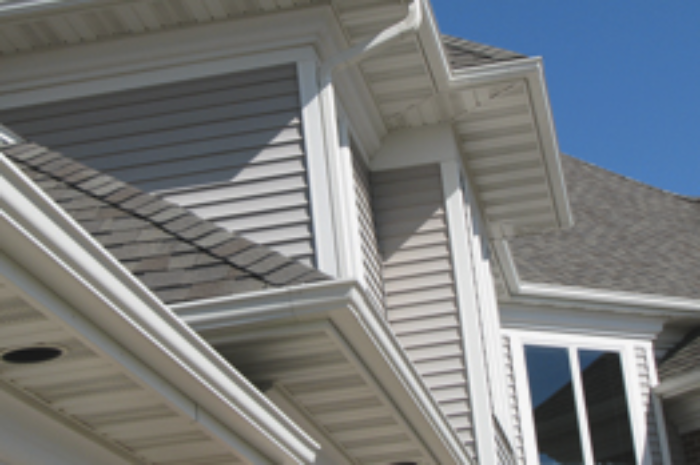MARCHING INTO SPRING: 6 PORCH IDEAS THAT MAKE YOU WANT TO BE OUTSIDE
Enjoy the beauty of the season from the comfort of your own doorstep with some fresh design tips.
READ MORE
When considering buying or replacing your home's gutters, the first question is often, “Does my house really need gutters?”
Gutters were typically thought of as unattractive additions to the home, so many new homeowners simply removed them for the sake of aesthetics. While removing flimsy, old gutters might improve the look of your home, gutters help prevent water damage. Removing them can mean opening your home to risk of additional wear and tear or, even worse, damage.
Heavy duty gutters are one of the most effective means of channeling water runoff safely away from the home and walkways. Not only do they help protect the siding from water stains, the basement from flooding, and icy sidewalks from forming in winter, but they also prevent erosion to the ground around your home. Overall, a gutter is necessary for anyone who deals with rain and snow melt-off on a regular basis.
So what kind of gutters are best for your home? The majority of homes are outfitted with .027 gauge gutters, which are often the easy and budget-friendly route to go. Gutters of this gauge will do very well on most homes that experience mild to moderate weather and little snow. However, an upgrade to .032 gutters is necessary for regions that experience very heavy rain, wind and snow.
The term “gauge” is used to describe the thickness of the aluminum. What is considered the industry standard for professionally installed aluminum gutters is .027 gauge. This would be a medium-weight aluminum compared to the .025 gutter systems that are sold in home supply stores. Upgrading to .032 gutters is recommended for maximum strength, but not needed for every home.
If you live in a region that experiences harsh, snowy weather, you may want to consider .032 gauge aluminum.
Although tempering does have an effect on metal strength, thicker aluminum will usually be stronger. One day of wet, dense snow can easily leave a normal gutter system sagging.
By upgrading from .027 to .032 aluminum, you'll get far better protection from the elements and, as a result, a much longer lifespan. A properly installed heavy gauge gutter system easily outlasts the average roof in most cases, thanks to a lifespan of over 20 years.
Aluminum is an excellent gutter material since it's resistant to rust, requires minimal maintenance, and is fairly lightweight compared to other materials. The advantages of aluminum are even more impressive when a heavier gauge gutter system is used.
Although the paint has much to do with how long your gutters will look brand new, it is true that a heavier gauge aluminum will maintain a straight, clean appearance for a longer period of time. Thin aluminum gutters often begin to show wear and tear more quickly than homeowners expect. This is particularly true for areas with heavy rain and snow, especially when combined with the weight of wet leaves. Over time, thinner gutters may begin to sag and the gutter itself splay outwards, especially if leaves and debris aren't regularly removed.
Maintaining gutters by regularly removing leaves increases the lifespan of the system, but even that comes with one downside. Thin aluminum can dent and bend fairly easily, especially long stretches of aluminum.
People typically place a ladder against their home to access the gutters for cleaning. Sadly, the pressure from the ladder combined with the weight of the person can easily leave noticeable dents in the gutter itself. This is fairly common with cheaply made, thin aluminum, but also could be possible with .027 aluminum. Using a ladder is a necessity for cleaner gutters, but a heavier duty .032 aluminum is more durable.
Heavy gauge aluminum gutters have a much longer lifespan and are less likely to dent from a ladder overall. If you live where hailstorms are common, a .032 gauge aluminum will be able to handle a hailstorm longer than .027 gauge before taking on any damage. This thicker aluminum is also less likely to sag or have the sides splay out, meaning the overall appearance of newly installed gutters will last longer.
Aluminum gutters are more common and overall less expensive. Home Advisor lists aluminum gutters at $6 to $12 per piece, while estimating steel gutters at $11 to over $33.
Even with aluminum being significantly less expensive, some homeowners still toy with the idea of installing steel gutters. When it comes down to value, a heavy gauge aluminum is still the better option for homes where steel isn't a necessity.
Aluminum is more rust-resistant, lighter in weight, and is a more affordable investment compared to steel under most circumstances. Heavy gauge aluminum is often considered superior in nearly every aspect when it comes to average home gutter system needs.
As you can see, there are significant reasons why having heavy gauge aluminum gutters is beneficial. While having gutters isn't listed in building codes, it is required to have some form of water drainage around your home. Gutters are the easiest and most effective method of diverting water runoff, and thanks to improvements in gutter design and the use of heavy gauge aluminum, gutters also add an aesthetic appeal to your home. If you're considering updating your current gutter system or having a system installed on a new house, research your options and what works best for your home, so you’re ready for whatever Mother Nature has in store.